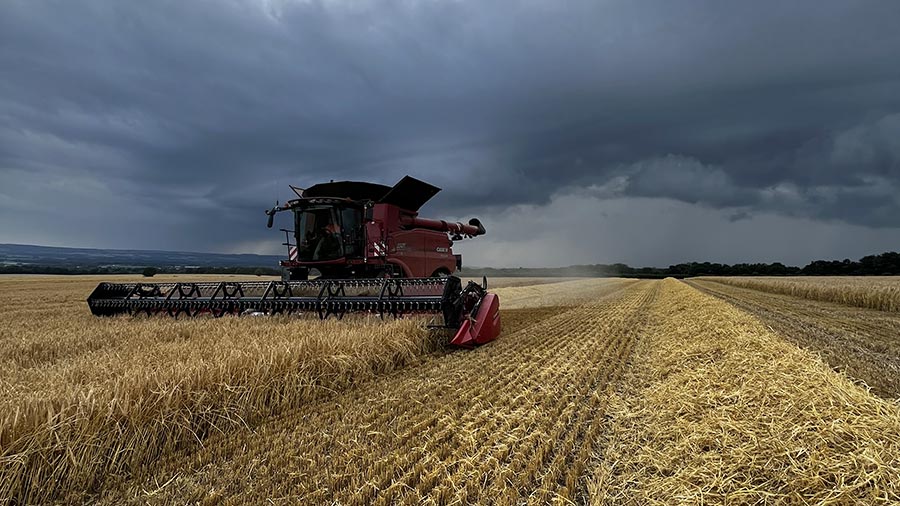Heavy rain hampers harvest progress across the UK
 Harvest dodging showers in Scarborough © Chris Baines (Harvest 2023 gallery)
Harvest dodging showers in Scarborough © Chris Baines (Harvest 2023 gallery) Heavy rain after weeks of dry weather and high temperatures is causing a harvesting headache for UK arable growers.
Most regions are experiencing a stop-start harvest, with AHDB reporting progress to be lagging behind the five-year average.
In Scotland, grower Willie Thomson was surveying fields on Monday morning (31 July) where heavy rain was falling onto straw yet to be baled.
See also: Share your harvest photos and videos
“If the weather doesn’t settle soon we could have a massive bottleneck but it doesn’t look hopeful because the forecast for the week is very unsettled,’’ said Mr Thomson, who grows 172ha of combinable crops in East Lothian and is combinable crops chairman at NFU Scotland.
The picture is repeated across Scotland, he said.
“Farmers are desperate to get their oilseed rape (OSR) harvested before getting busy with winter wheat which should be fit to harvest in 10 days.
“The window will close in if the rain keeps coming. OSR that has been harvested is coming off the fields at 10-14% moisture.
“It will need to be dried but it is a case of just getting it done to get the fields cleared.”
The situation is similar in Wales.
Andrew Davies grows 109ha of combinable crops in Pembrokeshire and is currently harvesting his OSR in between bouts of rain.
At 1.5t/acre, the yield is below his 1.75-1.8t average, as a result of the weather causing heavy shedding, and the moisture content is 10.8-11.8%.
The OSR harvest is the furthest ahead in the South West and the West Midlands.
Milling wheat fears
Meanwhile, the unsettled weather is causing concern over the ripening of milling wheat.
Richard Heady was able to harvest all his winter barley before the rain arrived but he is struggling to get his winter wheat off his fields near Milton Keynes.
“We are just having to snatch it when we can, get bits harvested here and there,” he said.
“We seem to be stuck in a pattern of heavy overnight rain, the crop taking all morning to dry out and then we only get a few hours of combining in before it rains again.
“But on the plus side we are getting yield and fairly good quality.”
Soil compaction is a major concern, with the combine leaving “big wheel marks” in wet fields.
“We had two very dry summers when compaction was not an issue but this year there is damage that we are going to have to address which is frustrating because we are trying to look after our soils,” added Mr Heady.
In its harvest commentary, AHDB said very small areas of winter wheat, spring barley and oats had been harvested, mostly in southern regions.

